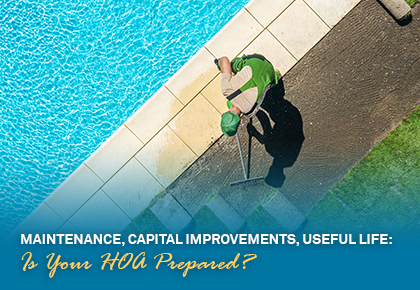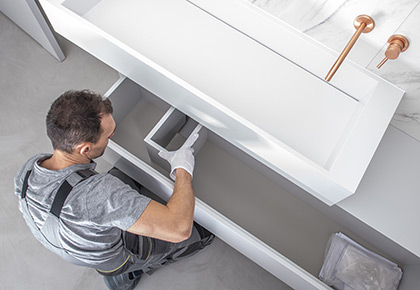-

Architectural Modifications: What are my HOA backyard rules?
In this article, we answer the most frequently asked questions regarding HOA backyard rules as well as steps for requesting an architectural modification to your home. -
Don’t Be the HOA Bad Guy: 4 Proven Policy Enforcement Tips
Enforcing HOA policies is nobody’s cup of tea, but having good policy enforcement in place helps improve the resident experience and elevates your reputation. Follow these 4 principles for healthy policy enforcement: -
Board Meeting Basics for Board Members
What can you do to ensure that your board meetings are well run? Follow these best practices to keep your board meetings on track. -
Is HOA Agreement a Unicorn? 3 Boards Share What It Takes
While maintenance, events, committees, and budget are all crucial aspects of managing a homeowners’ association, there's one even bigger challenge that board members face: HOA agreement and alignment. Read on to discover the secret to successful alignment among diverse individuals with distinct values. -
Creating and Enforcing Sample HOA Pet Rules That Work
With several Arizona cities ranking high in WalletHub’s 2016 listing of most pet-friendly cities, it’s likely that your community allows residents to have pets. Still, your homeowners association (HOA) needs to have a clear policy to prevent residents’ furry family members from becoming a community problem. After all, it isn’t really Rover’s fault if issues arise. It’s up to his owners to clean up after him, to ensure that he remains well behaved and to follow the HOA rules. -
Electronic Voting in Arizona - What You Should Know
These days, you can do almost anything online—buy groceries, look for a job or even find love. But what about voting on issues that affect your community? -
Before Creating a New HOA Policy, Ask These 5 Questions
Great policies can help your association run smoothly, enhance the resident experience and improve your reputation. Here are five questions to ask before creating a new HOA policy. -
5 Surprising Reasons to Raise Your HOA Assessments
If your main concern is to avoid increasing assessments, you may want to reconsider. As a board member, one of your primary fiduciary responsibilities is to protect property values, and assessments are an investment that helps do just that. -
Your HOA Board and Coronavirus: 5 Questions to Discuss
How should your HOA board handle a pandemic like COVID-19? Start by tackling these 5 questions -
HOA Policy: Why Consistent Communication Is Key
Learn why effective HOA policy starts with a strong communication plan. -
Don’t Be the HOA Bad Guy: 4 Proven Policy Enforcement Tips
Enforcing HOA policies is nobody’s cup of tea, but having good policy enforcement in place helps improve the resident experience and elevates your reputation. Follow these 4 principles for healthy policy enforcement: -
HOA Committees and Volunteers: 8 Rules to Rally Residents
A healthy and effective Arizona homeowners association is not only able to identify great volunteers and committee members, but will empower them to drive positive change in the community. But how do you get there? -

Maintenance, Capital Improvements, Useful Life: Is Your HOA Prepared?
Not sure which components you should fix and which you should replace entirely? You're not alone. Get the answers to some of your top questions about maintenance, capital improvements, and useful life. -
-
3 Strategies to Keep HOA Assessments Stable and Add Value
There are often valid reasons to raise assessments, but in some cases, you may want to take a different route. Here are three cost-saving strategies. -
HOA Communication Tools: What Your Board Should Know and Do
Have you considered the importance of effective board communication in your recipe for success? Follow these HOA communication tools and tips for a path to effective communication. -

React, Outsource, or Prevent? Find Your Association’s Maintenance Style
How does your Arizona association handle maintenance? Discover your association's unique maintenance style. -
-
An Ounce of Prevention
Like changing the oil in your car, regular maintenance on a building helps keeps everything working properly and safely. For stratas, some tasks are not optional, they are mandatory. -
Building Security Tips for the Holiday Season
Security risks increase exponentially during the holiday seasons for high-rise buildings. Many residents travel for the holidays, move to warmer weather during the winter months, or have an influx of guests and family members in and out. These factors make it easy for intruders to make it into the building, especially if there are no procedures in place to track the many people and deliveries in and out of the building. -
Calm in a Crisis - Emergency Preparedness Plan
A strata management company never wants to find itself in the midst of an emergency, but it can happen anytime and anywhere. Whether you face an outbreak of illness, earthquake, or a flood, the impact of any devastating event can be minimized if your council has prepared for it. No doubt, your council meetings are already chock full of agenda items, but it’s important to make emergency preparedness planning a priority. -
The Importance of Homeowners Insurance
Up to 60 percent of strata home owners in the Greater Vancouver Regional District lack insurance. A good policy will protect your biggest asset and help you keep your head above water. -
Customer Care: 7 Ways Your Management Company Should “Answer the Call"
If your community is managed by a strata management company, you probably have an after-hours number you can call for urgent issues. But what if you simply want to take care of day-to-day strata business? “People don’t operate in normal business hours anymore,” says Rolando Hernandez, national customer care director at FirstService Residential. “Residents and council members need to be able to take care of strata business how and when it’s convenient for them.” -
Effective Communication During Social Distancing
We will all need a measure of patience as we navigate changes related to the pandemic. Communications may move at a pace that’s different than we’re used to. As always, the best policy is to assume positive intentions from others, listen carefully and respond professionally.